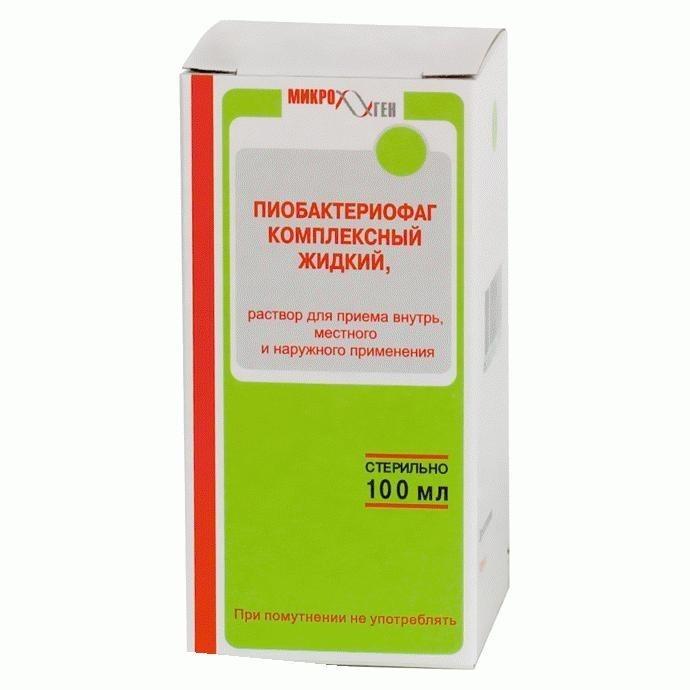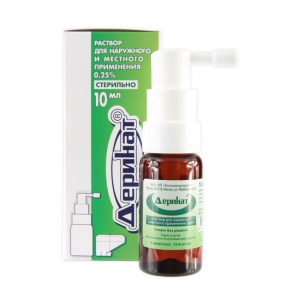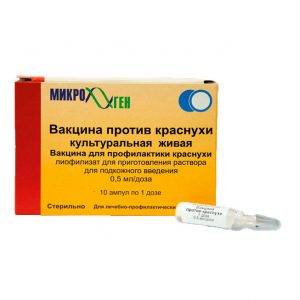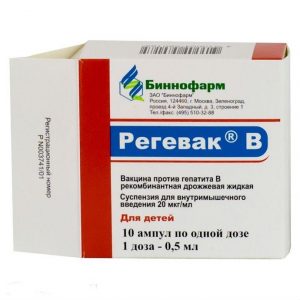Description
Latin name
Pyobacteriofag
Release form
Solution for oral administration and topical application.
Packaging
1 bottle 100 ml.
Pharmacological action
Pyobacteriophage complex liquid has the ability to specifically lyse the bacteria staphylococci, streptococci, enterococci, protea, Klebsiella pneumonia and oxytoca, Pseudomonas aeruginosa and Escherichia coli.
ways and lungs: inflammation of the sinuses of the nose, middle ear, tonsillitis, pharyngitis, laryngitis, tracheitis, bronchitis, pneumonia, pleurisy.
Surgical infections: suppuration of wounds, burns, abscess, phlegmon, boils, carbuncles, hydroadenitis, panaritium, paraproctitis, mastitis, bursitis, osteomyelitis.
Urogenital infections: urethritis, cystitis, pyelonephritis, colpitis, endometritis, salpingo-oophoritis.
Post-traumatic conjunctivitis, keratoconjunctivitis, purulent corneal ulcers and iridocyclitis.
Enteral infections: gastroenterocolitis, cholecystitis, dysbiosis.
Generic septic diseases.
Purulent-inflammatory diseases of the newborn: omphalitis, pyoderma, conjunctivitis, gastroenterocolitis, sepsis, etc.
Other diseases caused by bacteria staphylococci, streptococci, enterococci, Proteus, Klebsiella pneumonia and oxytoca, pyanorrhea and papillary.
For preventive purposes, the drug is used to treat surgical and freshly infected wounds, as well as for the prevention of nosocomial infections according to epidemic indications.
An important condition for effective phage therapy is a preliminary determination of the phage sensitivity of the pathogen.
Contraindications
None.
Use during pregnancy and lactation
It is possible to use the drug during pregnancy and during breastfeeding, if indicated.
Composition of
Solution contains:
Active substances:
a mixture of sterile staphylococcal phagolysate filtrates,
streptococci,
enterococci,
protea,
Klebsiella (pneumonia and oxytok),
Pseudomonas aeruginosa and Escherichia coli 100 ml.
Excipients:
preservative quinosol 0.0001 g / ml.
Dosage and administration of
Treatment of purulent-inflammatory diseases with localized lesions should be carried out simultaneously both locally and by mouth, 7-20 days (according to clinical indications).
Depending on the nature of the site of infection, the bacteriophage is used:
Locally in the form of irrigation, lotions and plugging with liquid phage in an amount of up to 200 ml, depending on the size of the affected area. With abscesses, the bacteriophage is introduced into the cavity of the lesion after removal of pus by puncture. The amount of drug administered should be slightly less than the volume of pus removed. In osteomyelitis, after appropriate surgical treatment, a bacteriophage of 10-20 ml is poured into the wound.
Introduction to the cavity – pleural, articular and other limited cavities up to 100 ml of bacteriophage, then leave capillary drainage, through which the bacteriophage is reintroduced for several days.
With cystitis, pyelonephritis, urethritis, the drug is taken orally. If the cavity of the bladder or renal pelvis is drained, the bacteriophage is injected through the cystostomy or nephrostoma 1-2 times a day, 20-50 ml into the bladder and 5-7 ml into the renal pelvis.
With purulent-inflammatory gynecological diseases, the drug is injected into the cavity of the vagina, uterus in a dose of 5-10 ml daily once.
With purulent-inflammatory diseases of the ear, throat, nose, the drug is administered at a dose of 2-10 ml 1-3 times a day. The bacteriophage is used to rinse, rinse, instill, administer moistened turundas (leaving them for 1 hour).
With conjunctivitis and keratoconjunctivitis, the drug is instilled 2-3 drops 4-5 times / day, with purulent corneal ulcer – 4-5 drops, with purulent iridocyclitis, the drug is used for 6-8 drops every 3 hours in combination with oral administration.
In the treatment of stomatitis and chronic generalized periodontitis, the drug is used in the form of mouth rinses 3-4 times a day at a dose of 10-20 ml, as well as the introduction of turundum soaked in pyobacteriophage into periodontal pockets for 5-10 minutes.
With intestinal forms of the disease, diseases of internal organs, dysbiosis, the bacteriophage is used through the mouth and in an enema. Bacteriophage is given through the mouth 3 times / day on an empty stomach 1 hour before meals. In the form of enemas, 1 time / day is prescribed instead of a single oral administration.
Recommended dosage:
Age 0-6 months. – 5 ml (dose for 1 dose orally) – 10 ml (dose for 1 dose rectally).
Age 6-12 months – 10 (dose for 1 dose orally) – 20 (dose for 1 dose rectally).
Age from 1 year to 3 years – 15 (dose per 1 dose orally) – 30 (dose per 1 dose rectally).
Age from 3 to 8 years – 20 (dose per 1 dose orally) – 40 (dose per 1 dose rectally).
Age of 8 years and older – 30 (dose per 1 dose orally) – 50 (dose per 1 dose rectally).
The use of bacteriophages does not preclude the use of other antibacterial drugs. If chemical antiseptics were used to treat wounds before the use of the bacteriophage, the wound should be thoroughly washed with a sterile 0.9% sodium chloride solution.
Use of a bacteriophage in children (up to 6 months). With sepsis, enterocolitis in newborns, including premature babies, the bacteriophage is used in the form of high enemas (through a gas tube or catheter) 2-3 times a day (see table).
In the absence of vomiting and regurgitation, it is possible to use the drug by mouth. In this case, it is mixed with breast milk. A combination of rectal (in enemas) and oral (through the mouth) use of the drug is possible. The course of treatment is 5-15 days.
With a recurring course of the disease, repeated courses of treatment are possible. In order to prevent sepsis and enterocolitis during intrauterine infection or the risk of nosocomial infection in newborns, the bacteriophage is used as enemas 2 times a day for 5-7 days.
In the treatment of omphalitis, pyoderma, infected wounds, the drug is used in the form of applications twice daily (a gauze napkin is moistened with a bacteriophage and applied to the umbilical wound or to the affected area of the skin).
Side effects
Not found.
Drug Interaction
Use of the drug is possible in combination with other drugs, including with antibiotics.
Overdose
Overdose assistance has not been established.
Storage conditions
Storage in accordance with SP 3.3.2.1248-03 at a temperature of 2 to 8 ° C in a dry, dark place and out of the reach of children. Freezing is not allowed.
Transportation in accordance with SP 3.3.2.1248-03 at a temperature of 2 ° to 8 ° C, transportation at a temperature of 9 ° to 25 ° C for no more than 1 month is allowed. Freezing is not allowed.
Expiration
2 years.
Deystvuyuschee substances
Pyobakteryofah
Possible product names
PIOBACTERIOPHAGE COMP. LIQUID 100ML
BIOBACTERIOPHAGE COMPLEX 100ML
Pyobacteriophage complex liquid rd r vnutr externally approx 100ml fl
Pyobacteriophage complex liquid. fl. 100ml Russia
Piobacteriophage complex liquid 100ml fl. B M
Microgen NGOs Russia




